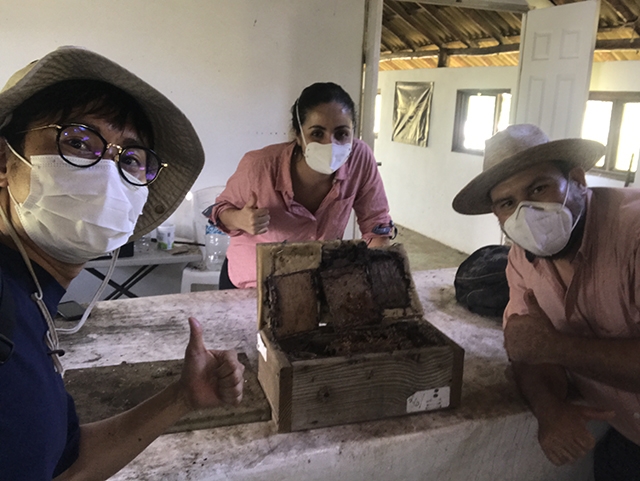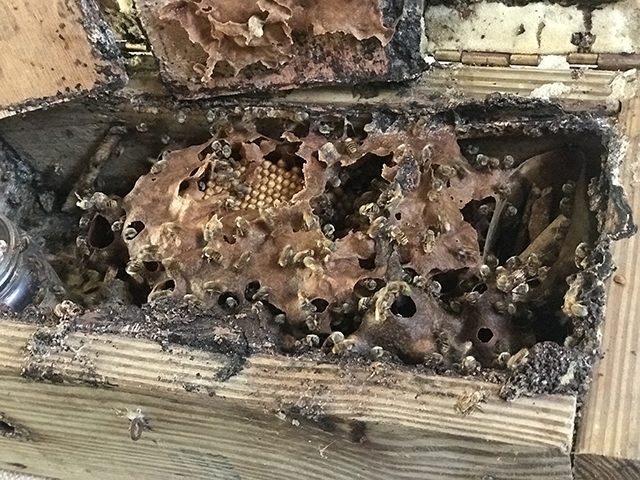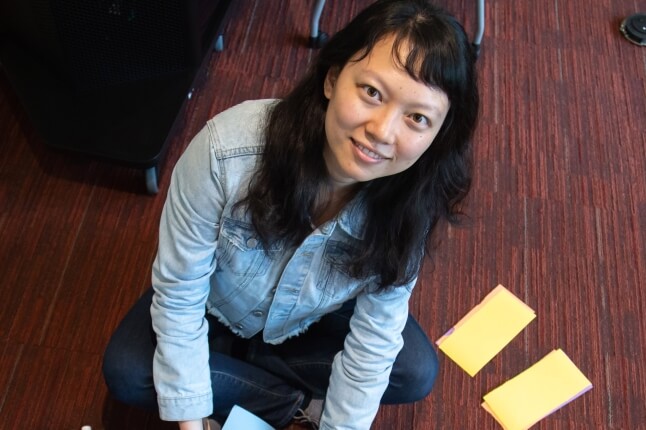News
Planet Bee co-founders (clockwise from upper left) Takeo Tokunari, Kelsey Burhans, Tomohito Okuda, and Jenny Jiang, want to make the sustainable practice of traditional beekeeping a more economically attractive endeavor for people living in the Amazon rainforest.
Since 2000, deforestation has wiped out nearly 200,000 square miles of the Amazon rainforest, an area roughly the size of Spain, according to a study by the Amazon Geo-Referenced Socio-Environmental Information Network.
Some deforestation is driven by poverty; residents of remote, under-resourced communities clear acres of rainforest to grow crops or raise cattle because they often have no other way to provide for their families.
It is a massive problem that may have a tiny solution—bees.
Planet Bee, a startup launched by four Harvard students, is working to make the sustainable practice of traditional beekeeping a more economically attractive endeavor for people living in the rainforest.
“Bees require pollen from flowers to produce honey, and resin from trees to build their hives, so they are dependent on the rainforest,” said Takeo Tokunari, a student in the Master’s in Design Engineering Program, offered jointly by the Harvard John A. Paulson School of Engineering and Applied Sciences and the Graduate School of Design. “So for melipona beekeepers, that provides a motivation to keep the forest, rather than destroying it, which would contribute to reducing deforestation.”
Tokunari identified beekeeping as a potential solution to rainforest deforestation in “Contemporary Developing Countries: Entrepreneurial Solutions to Intractable Problems” (GENED 1011). Prior to enrolling at Harvard, he worked on drought-resilient agriculture projects in Kenya and India with a Japanese biomass upcycling technology. The work fueled his passion for creating lasting social and environmental impacts through technology and business.
He partnered with MDE classmate Kelsey Burhans, who has expertise working in the social enterprise sphere in Bolivia and Peru. They were joined by MDE classmate Jenny Jiang, who leads product management, and Tomohito Okuda, an MPAID/MBA candidate at the Harvard Kennedy School and the MIT Sloan School of Management, who spearheads business development.
These beekeepers showcase the wooden hive box that is currently used for keeping melipona bees. (Image provided by Takeo Tokunari)
The team joined forces with the Peabiru Institute, a Brazilian nonprofit that works in the Amazon region to strengthen social organization and improve biodiversity. Peabiru leases bee hive boxes to families in the rainforest, and Planet Bee wants to optimize their beekeeping process.
The process centers on melipona, a species of stingless bees native to Central and South America. Because the bees are stingless, beekeepers don’t need special equipment to handle them, ensuring safety and reducing costs, Tokunari explained.
And since honey is nonperishable, if shipments are delayed due to transportation bottlenecks that plague remote areas of the Amazon, those delays will have less impact on the beekeepers’ revenue.
To help beekeepers earn more revenue, Planet Bee seeks to redesign the hive box so it is portable, biodegradable, and made from sustainable materials. They also plan to incorporate temperature and humidity sensors, cameras, and an image classification system so beekeepers could more easily assess the health of the hive.
“By collecting more data, we can help them scale up more easily and understand the factors that are contributing to success,” Burhans said. “Planet Bee and Peabiru are seeking to augment local knowledge. This is intended to be a collaborative effort with the communities, which uses data and research-driven training to make helpful suggestions, and part of that research is incorporating traditional knowledge networks.”
Honey from these melipona bees is a highly-valued product, often used in eye drops and skin medicines, and can sell for 10 times as much as common apis honey. (Photo provided by Takeo Tokunari)
Healthier hives means more honey, and Planet Bee plans to create new markets for a growing harvest.
Traditional melipona honey, which is typically sold as eye drops or skin medicines, can sell for 10 times as much as common apis honey in Mexico, Europe, and the U.S. By finding new customers and creating connections to lucrative markets outside the Amazon, the founders hope to dramatically improve the amount of income beekeepers can earn.
But there are many hurdles to overcome before they reach that stage.
The Amazon rainforest lies within the borders of nine countries, and each has its own distinct culture, economy, and regulatory environment. What works in one nation may not work in another, Burhans said.
Implementation will be another challenge.
“There are so many different dialects that are spoken in the Amazon, so making something that is inclusive of different spoken languages and literacy levels is a challenge,” she said. “And collecting hive data has its difficulties, too. In a lot of these remote communities, people have to travel to the next town to connect to WIFI or even charge their phones.”
The Planet Bee team hopes to give beekeepers in the Amazon rainforest more lucrative markets to sell the honey from melipona bees. (Photo provided by Takeo Tokunari)
Tokunari, Burhans, and their teammates are no strangers to tackling tough problems—it is exactly what they’re being trained to do in the MDE program. They are also taking advantage of the many entrepreneurial resources available in the Harvard Innovation Labs.
The co-founders hope to raise initial seed funding so they can prototype hive box designs and develop software to gather and organize data. Planet Bee recently received a $5,000 grant from the MIT Sandbox Innovation Fund Program. As they fine-tune prototypes, the team plans to begin approaching potential honey customers in search of new markets.
“I’m enjoying the ride we’re on now—it is a lot of learning and meeting fascinating people. But down the road, this is so exciting because it could have a lot of ripple effects, like influencing regulations or land rights for indigenous people, as well as female empowerment,” Burhans said. “A lot of our beekeepers are going to be women, so this is huge in boosting their ability to be autonomous and navigate in the world. We are protecting the environment and we’re protecting the ability of people to live dignified, empowered lives. I think that is a really promising and beautiful thing that can come out of this.”
Topics: Entrepreneurship
Cutting-edge science delivered direct to your inbox.
Join the Harvard SEAS mailing list.
Press Contact
Adam Zewe | 617-496-5878 | azewe@seas.harvard.edu






